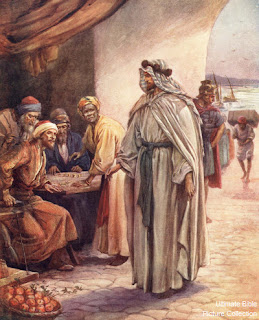TO CHEW ON: "Why do you show me iniquity, and cause me to see trouble?
....Why do you look on those who deal treacherously and hold Your tongue when the wicked devours a person more righteous than he?
Why do you make men like fish of the sea, like creeping things that have no ruler over them?" Habakkuk 1:3, 13, 14
The prophet Habakkuk lived during a critical period in Judah's history. Josiah's reforms had eroded so that Judah's citizens were now vulnerable to violence and oppression with little hope of help from a just legal system.The nation was also threatened from outside as Egypt and rising Babylon lusted after her. (Scholars date Habakkuk at about 600 B.C., the interval between the fall of Nineveh in 612 and the fall of Jerusalem in 586 B.C.)
As Habakkuk (who may have been a Levite or temple worker) views the state of his country and the world, all he has is questions. Why, God? Why this violence (to which God's reply, 'You haven't seen anything yet!' seems hardly satisfactory: Habakkuk 1:5-11)? Why, if You're so pure and just, do You allow the treachery I see all around me? Why do you allow the wicked person to triumph over the righteous one? Why do you allow men who act as brutish as animals, flourish in their mistreatment of others?
Who of us hasn't asked questions about the things we see around us?
- Why does God allow nation-crippling natural disasters?
- Why do some people seem to get all the bad breaks?
- Why do babies and children have to suffer with birth malformations and sickness?
- Why am I sick?
- Why can't my husband find a job?
And on and on...
My Bible's introduction to Habakkuk makes this observation about the book and how it relates to us:
"Habakkuk reminds us that the question "Why?" can, should and must be asked. His circumstances demanded that he ask God about the apparent reign of unrighteousness around him. Because he believed in God, he believed that God had an answer to his problem. His questions demonstrated the presence of faith, not the lack of it. For an atheist the question, "Why?" has no meaning; for a believer the question "Why?" finds its ultimate answer in God." - New Spirit-Filled Life Bible, p. 1223.
So, as Habakkuk did, let's bring our hard questions to God.
PRAYER: Dear God, help me to be honest with you, acknowledging when I am confused and frustrated. Thank You for inviting my questions. Help me to hear and understand Your answers. Amen.
MORE: Sing your questions and answers
A genre of music — Negro Spirituals — came out of the questions and dark times of the African slaves brought to America to work for white masters on plantations or in town. An article about the history of this music says:
"The lyrics of negro spirituals were tightly linked with the lives of their authors: slaves. While work songs dealt only with their daily life, spirituals were inspired by the message of Jesus Christ and his Good News (Gospel) of the Bible, “You can be saved”. They are different from hymns and psalms, because they were a way of sharing the hard condition of being a slave." (Read entire...)
Find out more about Negro Spirituals.
Negro Spirituals - what the music meant to the people who sang the songs.
Acapella Spirituals - "Nobody Knows the Trouble I've Seen"
















